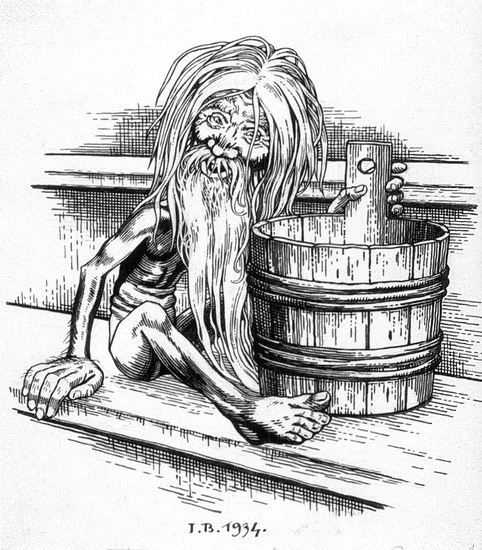Bestiary.
Domovoy aka Boroota. The Housekeeper. Kind trickster spirit, that keeps house safe. Can behave like a polterheist when angry on householders, of just feel like it.
 Kekemora
Kekemora. Domovoy's or Leshy's wife. A huge b*tch.
 Leshy
Leshy. The Forestkeeper. Most oftenly is hostile to human-beings.
 Vodyanoy
Vodyanoy. The Waterguy. A spirit of any natural reservoir.
 Veey
Veey. A one-eyed demon, capable of killing people and destroying the hole cities by just looking at them. His eyelid is so massive he needs assistance from lesser demons to actually fire that cannon.
 Beregeenya
Beregeenya. The Caretakeress/Coastmaid. Benevolent female spirit, guarding any natural water sources and people near them.
 Veela
Veela. Ghost of an unbaptized virgin girl. Ambigous creature very close to celtic Fairy.
Samoveela aka Samodiva. Evil version of Beregeenya. VERY evel. Known to steal infants, build houses of people and doing other Tzimisce stuff.
Poludnitsa. Noonwraith. Malevolent spirit, belived to be responsible for so called Horror of Noon and a heat stroke.
Oopyr'. Ghoul. Nuff said.
Roosalka. Undead. Ghost of someone (most oftenly - woman), who died violently, through suicide, drinking, or especially - tragic love. Couses troubles for lonely travelers, lure men yo a swamp or lake to drawn them and then - eat. In modern Russian language also - Mermaid.
 Mavka
Mavka. Poltergeist. Ghost of an unbaptized infant.
Lamia. Evil dragon.
Zdookhach. A benevolent land guardian, capable of taking forms of a dragon, horse or a humanbeing.
Huluh aka Shakran'. Ever-hungry threheaded dragon. Sometimes try eating the Sun.
Baba-Yaga. Ol' Ogg/Hag. Female spirit/deity/humanbeing of an extraordinary magical talent. Guardian of the forest and also - the border between Yav' and Nav'. One of her legs is skeletal in order to put it in Nav'. Ambiguos character, Baba-Yaga is said to play an important role in keeping the peace and balance, though been grumpy and noxious on the exterior.
Ol' Ogg lives in a small hut, built on a chicken legs - an image, that goes back to slavic tradition of burying dead in a special buildings, built on a high fundament.
Depending on a plot or a context Ol' Ogg can play a role of any of the Three Hecate's faces: helper (cold on the exterior but wery kind inside), antagonis (a classical evil witch) or a war
maidenbabooshka when it's about any threat from Nav'.
 Koschey the Undead
Koschey the Undead. Archlich. Nuff said. In most of Russian fairytales Koschey posses a classical filactery - his death is on the tip of a needle, the needle is in the egg, the egg is in the duck, the duck is in the hare, the hare is in the chest, and the chest is on the top of a huge well secured oak, growing far-far away (let us not forget, that in slavic mythology far-far away=afterworld).
 Alconost, Gamayoon, Stratim and Siren
Alconost, Gamayoon, Stratim and Siren. Harpies, who are not actually that evil, but can drive one mad with their song.
 Chort
Chort aka Bes. Imp. In modern Russian language - lesser demon.
Leekho. Forest deity, personification of natural disaster, trouble, danger, forest predators. Could be also smth like Vendigo.
Leekhoradka. aka Daughters of Herod. Modern Russian word for Fever. An evil deity of desieses. Always appears in a multiple form.
Bannik. The Saunakeeper. Similar to Domovoy, but nastier. It is said, that Bannik can kill a person who shows disrespect, or bang a girl who went alone in a sauna just for the sake of fun (and/or if she's asking for it

).
 Dvorovoy
Dvorovoy. The Yardkeeper.
Ovinniy. The Barnkeeper.